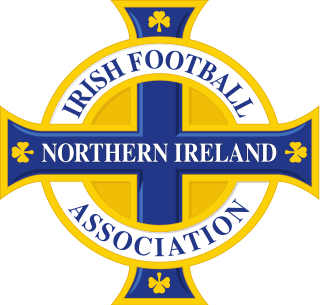
The Northern Ireland national football team represents Northern Ireland in men's international association football. From 1882 to 1950, all of Ireland was represented by a single side, the Ireland national football team, organised by the Irish Football Association (IFA). In 1921, the jurisdiction of the IFA was reduced to Northern Ireland following the secession of clubs in the soon-to-be Irish Free State, although its team remained the national team for all of Ireland until 1950, and used the name Ireland until the 1970s. The Football Association of Ireland (FAI) organises the separate Republic of Ireland national football team.

Linfield Football Club is a Northern Irish professional football club, based in south Belfast, which plays in the NIFL Premiership – the highest level of the Northern Ireland Football League. The fourth-oldest club on the island of Ireland, Linfield was founded in 1886 by workers at the Ulster Spinning Company's Linfield Mill. Since 1905, the club's home ground has been Windsor Park, which is also the home of the Northern Ireland national team and is the largest football stadium in Northern Ireland. They train at Midgley Park which is beside the stadium. The club's badge displays Windsor Castle, in reference to the ground's namesake.
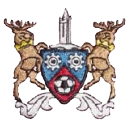
Ards Football Club is a semi-professional, Northern Irish football club playing in NIFL Championship. The club is based in Newtownards, but plays its home matches at Clandeboye Park in Bangor, which it rents from rivals Bangor to play home games. The club colours are red and blue.
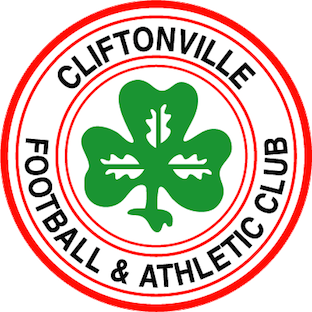
Cliftonville Football & Athletic Club is a semi-professional association football club playing in the NIFL Premiership – the top division of the Northern Ireland Football League. The club was founded in September 1879 by John McAlery in the suburb of Cliftonville in north Belfast and are the founders of football in Ireland.

Moyola Park Association Football Club is an intermediate, Northern Irish football club playing in the NIFL Premier Intermediate League. The club, founded in 1880, hails from Castledawson, near Magherafelt, County Londonderry, and plays its home matches at Fortwilliam Park with the club groundsharing with Tobermore United following the closure of Mill Meadow. Club colours are royal blue and yellow. The club won the inaugural Irish Cup in 1881. The club is managed by Kenny Shiels.
The Irish Football Association Challenge Cup, commonly referred to as the Irish Cup is the primary football knockout cup competition in Northern Ireland. Inaugurated in 1881, it is the fourth-oldest national cup competition in the world. Prior to the break-away from the Irish Football Association by clubs from what would become the Irish Free State in 1921, the Irish Cup was the national cup competition for the whole of Ireland.

Solitude is a football stadium in Belfast, Northern Ireland. It is the oldest football stadium in Ireland, and the home ground of Ireland's oldest football club, Cliftonville. The stadium holds 6,224, but is currently restricted to 2,530 under safety legislation.
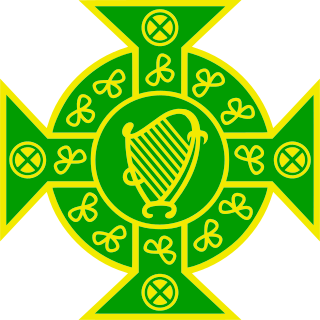
The Ireland national football team represented the island of Ireland in association football from 1882 until 1950. It was organised by the Irish Football Association (IFA), and is the fourth oldest international team in the world. It mainly played in the British Home Championship against England, Scotland and Wales. Though often vying with Wales to avoid the wooden spoon, Ireland won the Championship in 1914, and shared it with England and Scotland in 1903.
Watching and playing sports is an important part of culture in Belfast, Northern Ireland where almost six out of ten (59%) of the adult population regularly participate in one or more sports. Belfast has several notable sports teams playing a diverse variety of sports including football, rugby, traditional Irish Gaelic games, and North American sports such as American football and ice hockey (at the SSE Arena where the multiple time Elite Ice Hockey League champion Belfast Giants are based. The Belfast Marathon is run annually on May Day, and attracted 14,300 participants in 2007. Cycling, triathlon and athletics are also popular as both participation and spectator sports, with the first two stages of the 2014 Giro d'Italia starting from Belfast City Centre, and the annual high profile Belfast International Cross Country event being held in the grounds of Stormont Castle every year until 2009. The Stormont Estate is also one of the four home grounds for the Ireland cricket team, alongside Bready, Malahide and Clontarf, and also hosts the Northern Cricket Union provincial teams.
CIYMS Hockey Club is a hockey club based at C.I.Y.M.S. Sports Club, Circular Road, Belfast. Home fixtures are played on a sand-filled artificial surface. The club was founded in 1896 as Cliftonville and was one of the founding members of the Ulster Hockey Union. The 1st XI currently plays in the Ulster Senior League. The first reported match was played against North Down at Comber in November 1896 where an eight-goal to nil loss was recorded. In 2018, the club changed its name to CIYMS.
Ulster Football Club is a defunct Irish association football club that was based in Ballynafeigh, Belfast.
Cliftonville Cricket Club was a cricket club in Northern Ireland, playing in the NCU Senior League.
Ormeau Cricket Ground was a cricket ground in Belfast, Northern Ireland. The first recorded match on the ground was in 1867, when North of Ireland played an All-England Eleven in a non first-class match. In 1926, the ground hosted its first first-class match between Ireland and Wales. Eight further first-class matches have been played on the ground, the last of which was in 1999 between Ireland and Scotland. The first List A match held on the ground came in the 1996 NatWest Trophy between Ireland and Sussex, which resulted in a Sussex victory by 304 runs. The second and to date last List A match to be played there came in the 1999 NatWest Trophy when Ireland played the Essex Cricket Board, which Ireland won by 2 wickets. In 1987, the ground hosted a Women's One Day International between Ireland women and the Australia women, which resulted in a 110 run victory for Australia women.
The Antrim Road is a major arterial route and area of housing and commerce that runs from inner city north Belfast to Dunadry, passing through Newtownabbey and Templepatrick. It forms part of the A6 road, a traffic route which links Belfast to Derry. It passes through the New Lodge, Newington and Glengormley areas of Northern Ireland amongst others.

The Big Two derby, also referred to simply as the Big Two or Bel Classico, is the name given to the association football derby between Belfast clubs, Linfield and Glentoran. The derby is also sometimes referred to as the Belfast derby. They are the two most successful and most supported clubs in Northern Ireland league football. They traditionally face each other on Boxing Day each year which usually attracts the largest NIFL Premiership attendance of the season. They regularly play each other in the league, and have contested more cup finals together than any other two clubs. They also make up two of the three clubs that have competed in every season of Northern Ireland's top flight since its inception in 1890 – neither club ever suffering relegation.
Crumlin Star Football Club is an intermediate, Northern Irish association football club based in Belfast, and playing in the Premier Division of the Northern Amateur Football League. The club plays in black.
Wellington Park Football Club is a former Irish football club from Belfast.
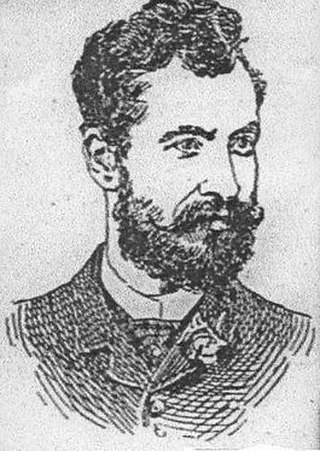
John McCredy McAlery was an Irish association football pioneer. His accomplishments include organizing the first ever properly organized football match in the history of Irish football in 1878, founding the first Irish football club in 1879, helping found the Irish Football Association in 1880, and wearing the captain's armband in Ireland's first ever international match in 1882. He is known as the "father of Irish association football."
William Morrow was an Irish footballer who played in the 1880s, most notably for Moyola Park. He was a winner of the inaugural Irish Cup and earned three caps for Ireland.
Banbridge Football Club is a former Irish football club, from the town of Banbridge, and was one of the first four clubs to be formed in Ireland.









